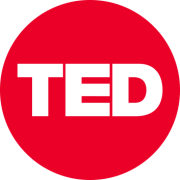https://blog.ted.com/mystery-notes-from-session-8-of-ted2019/
- |
To kick off day 4 of TED2019, we give you (many more) reasons to get a good night’s sleep, plunge into the massive microbiome in the Earth’s crust — and much, more more.
The event: Talks from TED2019, Session 8: Mystery, hosted by head of TED Chris Anderson and TED’s science curator David Biello
When and where: Thursday, April 16, 2019, 8:45am, at the Vancouver Convention Centre in Vancouver, BC
Speakers: Andrew Marantz, Kristie Ebi, Asmeret Asefaw Berhe, Edward Tenner, Matt Walker and Karen Lloyd
The talks in brief:
Andrew Marantz, journalist, author who writes about the internet
- Big idea: We have the power — and responsibility — to steer digital conversation away from noxious conspiracies and toward an open, equal world.
- How? The internet isn’t inherently toxic or wholesome — after all, it’s shaped by us, every day. Andrew Marantz would know: he’s spent three years interviewing the loudest, cruelest people igniting conversation online. He discovered that people can be radicalized to hate through social media, messaging boards and other internet rabbit holes because these tools maximize their algorithms for engagement at all costs. And what drives engagement? Intense emotion, not facts or healthy debate. Marantz calls for social media companies to change their algorithms — and, in the meantime, offers three ways we can help build a better internet: Be a smart skeptic; know that “free speech” is only the start of the conversation; and emphasize human decency over empty outrage. The internet is vast and sometimes terrible, but we can make little actions to make it a safer, healthier and more open place. So, keep sharing cute cat memes!
- Quote of the talk: “We’ve ended up in this bizarre dynamic online where some people see bigoted propaganda as being edgy, and see basic truth and human decency as pearl-clutching.”
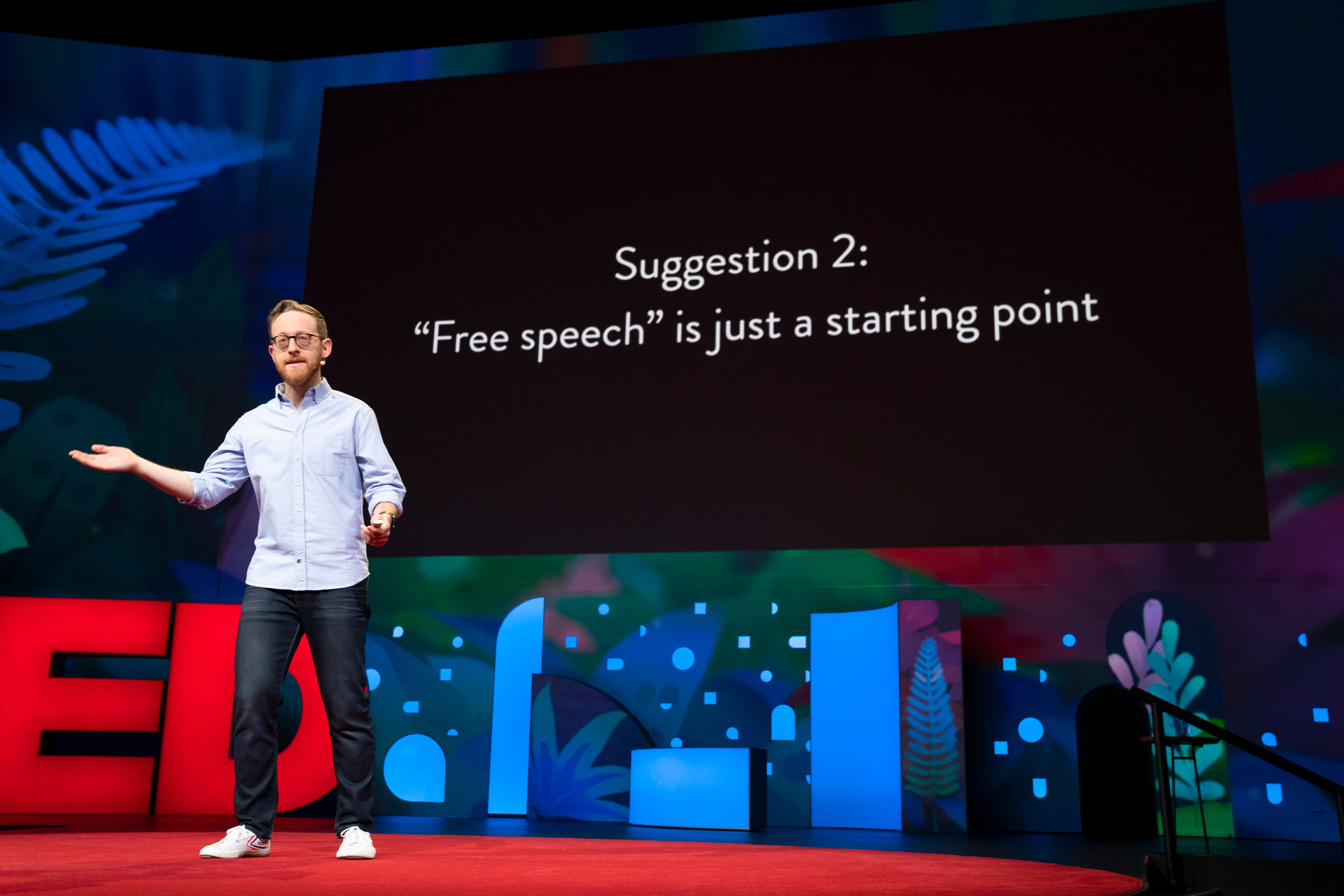
“Free speech is just a starting point,” says Andrew Marantz onstage at TED2019: Bigger Than Us, April 18, 2019, Vancouver, BC, Canada. Photo: Bret Hartman / TED
Kristie Ebi, public health researcher, director of the Center for Health and the Global Environment
- Big idea: Climate change is affecting the foods we love — and not in a good way. The time to act is now.
- How? As we continue to burn fossil fuels, the concentration of CO2 in the atmosphere rises. This much we know. But Ebi’s team is discovering a new wrinkle in our changing climate: all this CO2 is altering the nutritional quality of some key global staples, like rice, potatoes and wheat. Indeed, the very chemistry of these crops is being modified, reducing levels of protein, vitamins and nutrients — which could spell disaster for the more than two billion people who subsist on rice, for instance, as their primary food source. But we don’t have to sit by and watch this crisis unfold: Ebi calls for large-scale research projects that study the degradation of our food and put pressure on the world to quit fossil fuels.
- Quote of the talk: “It’s been said that if you think education is expensive, try ignorance. Let’s not. Let’s invest in ourselves, in our children and in our planet.”
Asmeret Asefaw Berhe, scientist and “dirt detective” studying the impact of ecological change on our soils
- Big idea: The earth’s soil is not only necessary for agriculture — it’s also an under-appreciated resource in the fight against climate change.
- How? Human beings tend to treat soil like, well, dirt: half of the world’s soil has been degraded by human activity. But soil stores carbon — 3,000 billion metric tons of it, in fact, equivalent to 315 times the amount entering our atmosphere (and contributing to climate change) every year. Picture this: there’s more than twice as much carbon in soil as there is in all of the world’s vegetation — the lush tropical rainforests, giant sequoias, expansive grasslands, every kind of flora you can imagine on Earth — plus all the carbon currently up in the atmosphere, combined. If we treated soil with more respect, Berhe says, it could be a valuable tool to not only fight, but also eventually reverse, global warming.
- Quote of the talk: “Soil is just a thin veil that covers the surface of land, but it has the power to shape our planet’s destiny… [it] represents the difference between life and lifelessness in the earth’s system.”
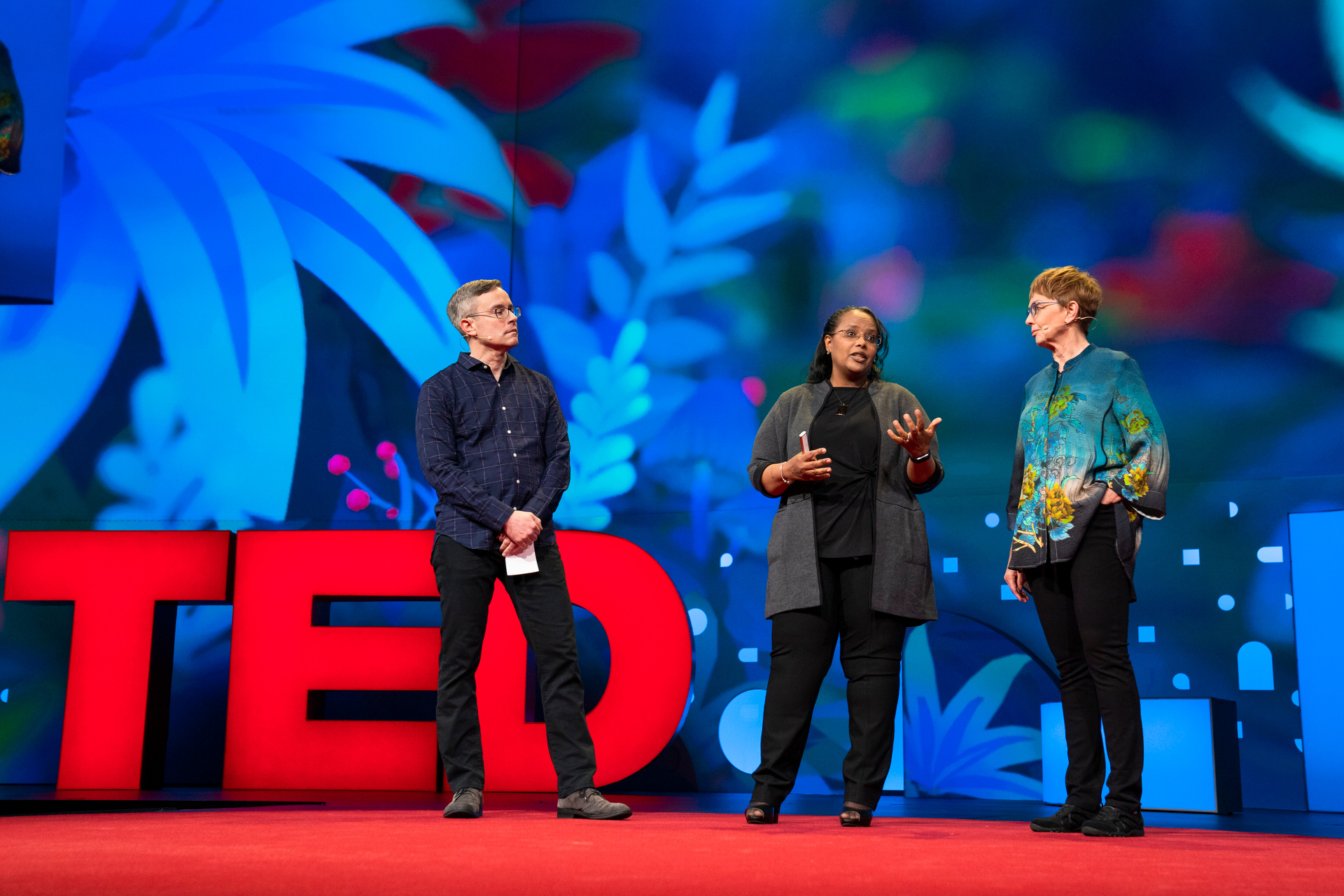
Host David Biello speaks with soil scientist Asmeret Asefaw Berhe and public health researcher Kristie Ebi during Session 8 of TED2019: Bigger Than Us. April 18, 2019, Vancouver, BC, Canada. Photo: Bret Hartman / TED
Asmeret Asefaw Berhe, Kristie Ebi and Joanne Chory in conversation with TED’s science curator David Biello
- Big idea: CO2 is basically junk food for plants. As plants consume more and more CO2 from the air, they’re drawing up fewer of the trace nutrients from the soil that humans need to eat. What can we do to make sure plants stay nutritious?
- How? Yes, we’re grateful to the plants that capture carbon dioxide from the air — but as Kristie Ebi notes, in the process, they’re taking up fewer nutrients from the soil that humans need. As Asmeret says: “There are 13 nutrients that plants get only from soil. They’re created from soil weathering, and that’s a very slow process.” To solve these interlocking problems — helping rebuild the soil, helping plants capture carbon, and helping us humans get our nutrients — we need all hands on deck, and many approaches to the problem. But as Joanne Chory, from the audience, reminds us, “I think we can get the plants to help us; they’ve done it before.”
- Quote of the talk: Kristie Ebi: “Plants are growing for their own benefit. They’re not growing for ours. They don’t actually care if you don’t get the nutrition you need; it’s not on their agenda.”
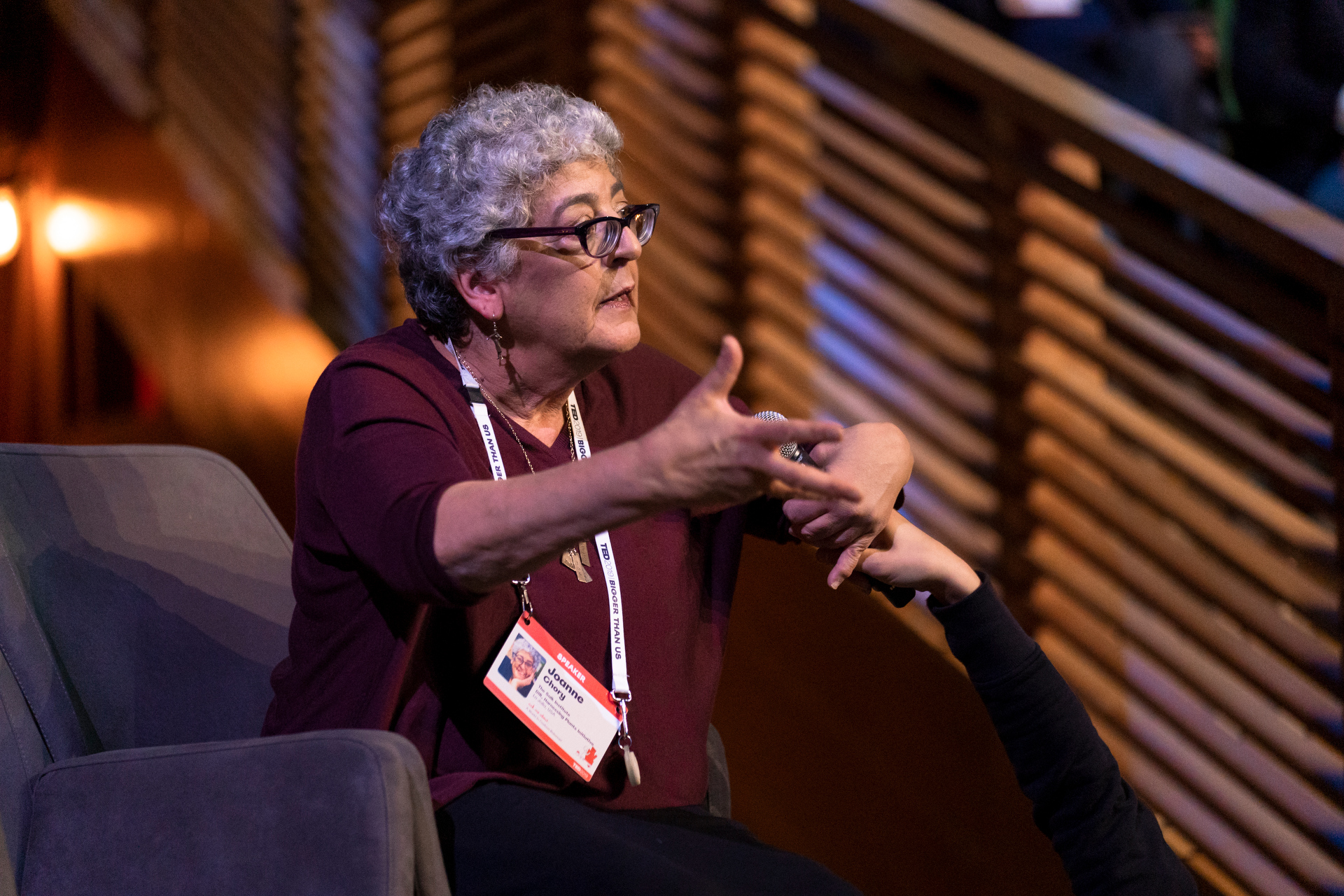
Speaking from the audience, Joanne Chory joins the conversation with soil scientist Asmeret Asefaw Berhe and public health researcher Kristie Ebi at TED2019: Bigger Than Us, April 18, 2019, Vancouver, BC, Canada. Photo: Marla Aufmuth / TED
Edward Tenner, writer and historian
- Big idea: An obsession with efficiency can actually make us less efficient. What we need is “inspired inefficiency.”
- How? Our pursuit of more for less can cause us to get in our own way. Switching to electronic medical records made it easier to exchange information, for instance, but also left doctors filling out forms for hours — and feeling they have less time to spend with patients. Efficiency, Tenner says, is best served with a side of intuition, and a willingness to take the scenic route rather than cutting straight through to automation. Tenner’s advice: Allow for great things to happen by accident, embrace trying the hard way and seek security in diversity. “We have no way to tell who is going to be useful in the future,” he says. “We need to supplement whatever the algorithm tells us … by looking for people with various backgrounds and various outlooks.”
- Quote of the talk: “Sometimes the best way to move forward is to follow a circle.”
Matt Walker, sleep scientist
- Big idea: If you want to live a longer and healthier life, get more sleep. And beware, the opposite holds true: the less your sleep, the shorter your life expectancy and the higher chance you have of getting a life-threatening illness.
- How? Walker has seen the results of a good night’s sleep on the brain – and the frightening results of a bad one. Consider one study: the brains of participants who slept a full night lit up with healthy learning-related activity in their hippocampi, the “informational inbox” of the brain. Those who were sleep-deprived, however, showed hippocampi that basically shut down. But why, exactly, is a good night’s sleep so good for the brain? It’s all about the deep sleep brain waves, Walker says: those tiny pulses of electrical activity that transfer memories from the brain’s short-term, vulnerable area into long-term storage. These findings have vast potential implications on aging and dementia, our education system and our immune systems. Feeling tired? Listen to your body! As Walker says: “Sleep is the Swiss Army knife of health.”
- Quotes from the talk: “Sleep, unfortunately, is not an optional lifestyle luxury. Sleep is a non-negotiable biological necessity. It is your life support system, and it is mother nature’s best effort yet at immortality.”
Karen Lloyd, microbiologist
- Big idea: Deep in the Earth’s crust, carbon-sucking microbes have survived for hundreds of thousands of years. And we just might be able to use them to store excess CO2 — and slow down climate change.
- How? Karen Lloyd studied microbes in hot springs and volcanoes in Costa Rica, and the results were astounding: as a side effect of its very slow survival, chemolithoautotroph — a kind of microbe that eats by turning rocks into other kinds of rocks — locks carbon deep in the Earth, turning CO2 into carbonate mineral. And it gets better: there are more CO2-reducing microbes laying in wait elsewhere in the Earth’s biosphere, from the Arctic to the mud in the Marianas Trench. We’re not sure how they’ll react to a rush of new carbon from the atmosphere, so we’ll need more research to illuminate possible negative (or positive!) results.
- Quote of the talk: “It may seem like life buried deep within the Earth’s crust is so far away from our daily experiences, but this weird, slow life may actually have the answers to some of the greatest mysteries to life on Earth.”
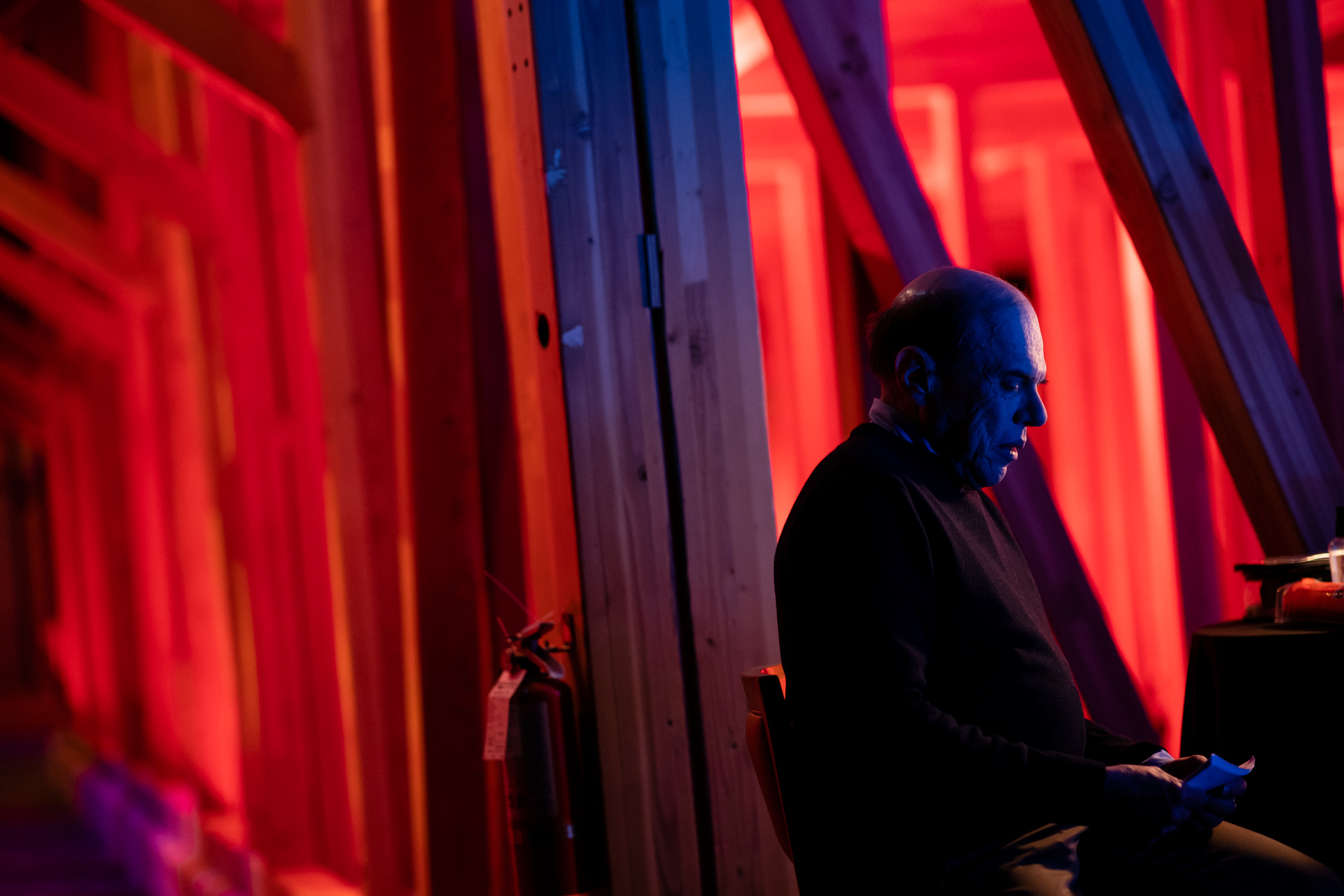
Before his talk, historian Edward Tenner reviews his notes one last time backstage at TED2019: Bigger Than Us, on April 18, 2019, Vancouver, BC, Canada. Photo: Lawrence Sumulong / TED
